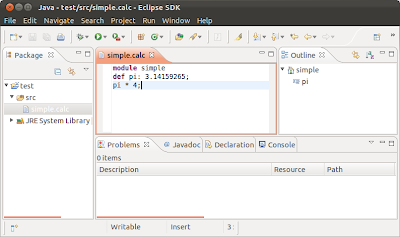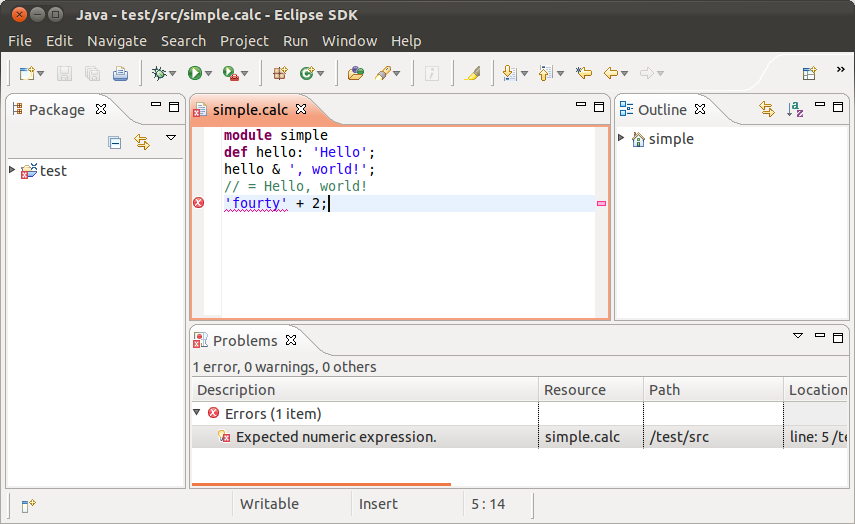In this post I describe my experience with the recent version (2.1) of Xtext, a framework for developing domain specific languages (DSLs).
The main input for Xtext is a grammar file written in an elegant little
language.
The grammar language uses a variation of Extended Backus-Naur
Form to
define rules for both terminals and nonterminals. So far this is very
similar to parser generators like GNU
bison or ANTLR
which can create parsers out of similar grammar definitions. I have a
lot of experience with parser generators and have become a bit sceptical
about them. A hand-written parser is often easier to debug and maintain
compared to a generated one. From my experience other parts of the
language development process like semantic analysis or code generation
are usually more complicated and at the same time these receive much
less attention from the developers of automated tools. What makes Xtext
different is that it not only generates a parser and a lexer but also a
full-blown Eclipse IDE tailored for your language. So I decided to give
Xtext a try and develop a toy language with it. I take a shortcut and
start from one of the examples that come with Xtext. Choosing
File -> New -> Example... and
selecting Xtext Simple Arithmetic Example under the Xtext Examples
category creates three projects:
- org.eclipse.xtext.example.arithmetics (main)
- org.eclipse.xtext.example.arithmetics.tests (tests)
- org.eclipse.xtext.example.arithmetics.ui (ui)
The main project contains the grammar file Arithmetic.xtext for the
language. Following is an example of input that it accepts:
module simple
def pi: 3.14159265;
pi * 4;
Here is how it looks in Eclipse:

Syntax colouring, content assist, the Outline and Problems views - all
work nicely. Let's now extend this language. First I add support
for scientific
notation, like
6.02e23, in floating-point literals. The following modification of the
NUMBER terminal does the job:
terminal NUMBER returns ecore::EBigDecimal:
(('0'..'9')+ ('.' ('0'..'9')*)? | '.' ('0'..'9')+)
(('e' | 'E') ('+' | '-')? ('0'..'9')+)?;
Next I add support for string expressions. To check for errors like
trying to divide a string by a number I introduce a simple type system
that consists of three types - NUMBER, STRING and INVALID with the
latter used in case of errors. The type is represented by the following
simple enum added to the main project:
public enum Type {
INVALID,
NUMBER,
STRING
}
Then I add a string concatenation expression which uses the & operator
and replace multiple classes for binary expressions with a single class
BinaryExpr to make writing validation checks easier:
...
Expression returns Expr:
Concatenation;
Concatenation returns Expr:
Addition
({BinaryExpr.left=current} op=('&') right=Addition)*;
Addition returns Expr:
Multiplication
({BinaryExpr.left=current} op=('+' | '-') right=Multiplication)*;
Multiplication returns Expr:
PrimaryExpression
({BinaryExpr.left=current} op=('*' | '/') right=PrimaryExpression)*;
PrimaryExpression returns Expr:
'(' Expression ')' |
{NumberLiteral} value=NUMBER |
{StringLiteral} value=STRING |
{FunctionCall} func=[AbstractDefinition]
('(' args+=Expression (',' args+=Expression)* ')')?;
...
The next step is to add the type checks to the validator. Unfortunately Xtext validator does pre-order traversal of the AST while to check expression types we need post-order, because the type of an expression depends on the types of its subexpressions. It is easy to implement such traversal manually:
...
public class ArithmeticsJavaValidator
extends AbstractArithmeticsJavaValidator {
@Inject
private Calculator calculator;
private Map<Expr, Type> types = new HashMap<Expr, Type>();
private boolean checkNumeric(Expr parent, Expr e,
EStructuralFeature feature, int index) {
Type type = checkType(e);
if (type == Type.NUMBER)
return true;
if (type != Type.INVALID) {
error("Expected numeric expression.", parent, feature,
index);
}
return false;
}
private boolean checkString(Expr parent, Expr e,
EStructuralFeature feature) {
Type type = checkType(e);
if (type == Type.STRING)
return true;
if (type != Type.INVALID) {
error("Expected numeric expression.", parent, feature,
ValidationMessageAcceptor.INSIGNIFICANT_INDEX);
}
return false;
}
private boolean checkNumeric(Expr parent, Expr e,
EStructuralFeature feature) {
return checkNumeric(parent, e, feature,
ValidationMessageAcceptor.INSIGNIFICANT_INDEX);
}
public Type checkType(Expr expr) {
Type type = types.get(expr);
if (type != null)
return type;
if (expr instanceof NumberLiteral) {
type = Type.NUMBER;
} else if (expr instanceof StringLiteral) {
type = Type.STRING;
} else if (expr instanceof BinaryExpr) {
BinaryExpr be = (BinaryExpr) expr;
type = Type.INVALID;
Expr left = be.getLeft(), right = be.getRight();
if (!be.getOp().equals("&")) {
if (checkNumeric(expr, left,
ArithmeticsPackage.Literals.BINARY_EXPR__LEFT)
&& checkNumeric(expr, right,
ArithmeticsPackage.Literals.BINARY_EXPR__RIGHT))
type = Type.NUMBER;
} else {
if (checkString(expr, left,
ArithmeticsPackage.Literals.BINARY_EXPR__LEFT)
&& checkString(expr, right,
ArithmeticsPackage.Literals.BINARY_EXPR__RIGHT))
type = Type.STRING;
}
} else if (expr instanceof FunctionCall) {
FunctionCall call = (FunctionCall) expr;
EList<Expr> args = call.getArgs();
AbstractDefinition func = ((FunctionCall) expr).getFunc();
if (func instanceof Definition)
type = checkType(((Definition) func).getExpr());
else
type = Type.NUMBER;
for (int i = 0, n = args.size(); i < n; i++) {
if (!checkNumeric(expr, args.get(i),
ArithmeticsPackage.Literals.FUNCTION_CALL__ARGS, i))
type = Type.INVALID;
}
}
types.put(expr, type);
return type;
}
@Check
public void check(Module m) {
types.clear();
}
public final static String NORMALIZABLE = "normalizable-expression";
@Check
public void check(Expr expr) {
Type type = checkType(expr);
if (type != Type.NUMBER)
return;
// ignore literals
if ((expr instanceof NumberLiteral) ||
(expr instanceof FunctionCall))
return;
// ignore evaluations
if (EcoreUtil2.getContainerOfType(expr, Evaluation.class)!=null)
return;
TreeIterator<EObject> contents = expr.eAllContents();
while(contents.hasNext()) {
EObject next = contents.next();
if (next instanceof FunctionCall) {
return;
}
}
BigDecimal decimal = calculator.evaluateNumeric(expr);
if (decimal.toString().length()<=8) {
warning(
"Expression could be normalized to constant '" +
decimal + "'",
null,
ValidationMessageAcceptor.INSIGNIFICANT_INDEX,
NORMALIZABLE,
decimal.toString());
}
}
}
As you can see from the above code the type checks aren't really pretty
with all the instanceofs and casts. If I had more control over the
generated AST classes I would apply the Visitor
pattern and implemented
the type checker as a visitor. However this can be mitigated with the
help of the poorly documented
PolymorphicDispatcher.
Next I modify the Calculator class that implements evaluation to
handle string concatenation. Also the evaluation methods should return
Object instead of BigDecimal because the value of an expression can
be a string or a number:
...
public class Calculator {
private PolymorphicDispatcher<Object> dispatcher =
PolymorphicDispatcher.createForSingleTarget(
"internalEvaluate", 2, 2, this);
public Object evaluate(Expr obj) {
return evaluate(obj, ImmutableMap.<String,Object>of());
}
public BigDecimal evaluateNumeric(Expr obj) {
return (BigDecimal)evaluate(obj);
}
public Object evaluate(Expr obj,
ImmutableMap<String, Object> values) {
Object invoke = dispatcher.invoke(obj, values);
return invoke;
}
public BigDecimal evaluateNumeric(Expr obj,
ImmutableMap<String, Object> values) {
return (BigDecimal)evaluate(obj, values);
}
protected Object internalEvaluate(Expr e,
ImmutableMap<String, Object> values) {
throw new UnsupportedOperationException(e.toString());
}
protected Object internalEvaluate(NumberLiteral e,
ImmutableMap<String, Object> values) {
return e.getValue();
}
protected Object internalEvaluate(StringLiteral e,
ImmutableMap<String, Object> values) {
return e.getValue();
}
protected Object internalEvaluate(FunctionCall e,
ImmutableMap<String, Object> values) {
if (e.getFunc() instanceof DeclaredParameter) {
return values.get(e.getFunc().getName());
}
Definition d = (Definition) e.getFunc();
Map<String,Object> params = Maps.newHashMap();
for (int i = 0; i < e.getArgs().size(); i++) {
DeclaredParameter declaredParameter = d.getArgs().get(i);
Object evaluate = evaluate(e.getArgs().get(i), values);
params.put(declaredParameter.getName(), evaluate);
}
return evaluate(d.getExpr(),ImmutableMap.copyOf(params));
}
protected Object internalEvaluate(BinaryExpr e,
ImmutableMap<String, Object> values) {
Resource res = e.eResource();
if (!res.getErrors().isEmpty())
return null;
char op = e.getOp().charAt(0);
if (op == '&') {
return (String)evaluate(e.getLeft(), values) +
evaluate(e.getRight(), values);
}
BigDecimal left = evaluateNumeric(e.getLeft(), values);
BigDecimal right = evaluateNumeric(e.getRight(), values);
switch (op) {
case '+': return left.add(right);
case '-': return left.subtract(right);
case '*': return left.multiply(right);
case '/': return left.divide(right, 20, RoundingMode.HALF_UP);
}
throw new UnsupportedOperationException(e.getOp());
}
}
And finally I change the InterpreterAutoEdit class in the ui project
to check types before evaluation:
...
public class InterpreterAutoEdit implements IAutoEditStrategy {
public void customizeDocumentCommand(IDocument document,
DocumentCommand command) {
for (String lineDelimiter : document.getLegalLineDelimiters()) {
if (command.text.equals(lineDelimiter)) {
int line;
int lineStart;
try {
line = document.getLineOfOffset(command.offset);
lineStart = document.getLineOffset(line);
if (!document.get(lineStart, 3).equals("def")) {
Object computedResult = computeResult(document,
command);
if (computedResult != null) {
command.text = lineDelimiter + "// = " +
computedResult + lineDelimiter;
}
}
} catch (BadLocationException e) {
// ignore
}
}
}
}
private Object computeResult(IDocument document,
final DocumentCommand command) {
return ((IXtextDocument) document).readOnly(new
IUnitOfWork<Object, XtextResource>() {
public Object exec(XtextResource state)
throws Exception {
Evaluation stmt = findEvaluation(command, state);
if (stmt == null)
return null;
return evaluate(stmt);
}
});
}
protected Object evaluate(Evaluation stmt) {
ArithmeticsJavaValidator validator =
new ArithmeticsJavaValidator();
Expr expr = stmt.getExpression();
// Ignore all messages.
validator.setMessageAcceptor(new ValidationMessageAcceptor() {
public void acceptError(String message, EObject object,
EStructuralFeature feature, int index, String code,
String... issueData) {
}
public void acceptError(String message, EObject object,
int offset, int length, String code,
String... issueData) {
}
public void acceptWarning(String message, EObject object,
EStructuralFeature feature, int index, String code,
String... issueData) {
}
public void acceptWarning(String message, EObject object,
int offset, int length, String code,
String... issueData) {
}
public void acceptInfo(String message, EObject object,
EStructuralFeature feature, int index, String code,
String... issueData) {
}
public void acceptInfo(String message, EObject object,
int offset, int length, String code,
String... issueData) {
}
});
return validator.checkType(expr) != Type.INVALID ?
new Calculator().evaluate(expr) : "?";
}
...
}
After implementing the above changes and re-generating Xtext artefacts, I get an Eclipse IDE for the language with simple string expressions and type checking:

Last modified on 2011-12-03